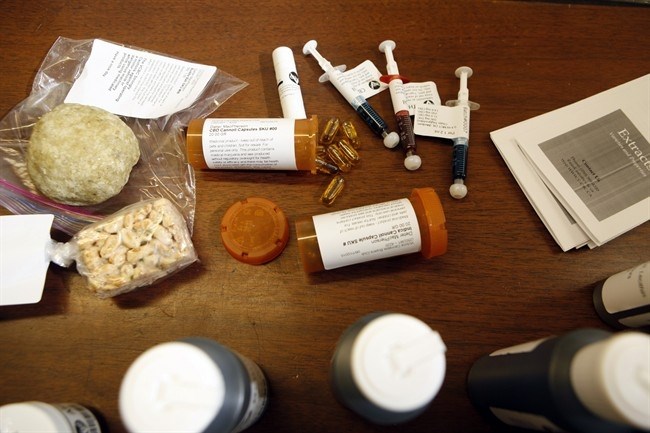
Various uses for cannabis oil is sold to customers at the Cannabis Buyers Club, in Victoria B.C., Thursday June 11, 2015.
Image Credit: THE CANADIAN PRESS/Chad Hipolito
June 12, 2015 - 8:26 AM
VANCOUVER - Marijuana-medicated brownies, teas and oils are now on the menu for patients who prefer ingesting their treatment, yet commercially licensed pot producers say a high court ruling doesn't set out clear directions for them.
Lawyers at the cannabis industry's national association are hashing out the impact of a Supreme Court of Canada ruling on Thursday that struck down limits on what constitutes legally allowable forms of medicinal pot.
"It's certainly confusing," said Eric Paul, a director on the board of the Canadian Medical Cannabis Industry Association.
"Does this mean the legislation we're governed by ... gives us the right to provide oral products or edibles or some other form?
"The answer is that it's not clear at the moment."
The high court decision gives medical marijuana users the right to both possess and consume cannabis derivatives, such as edibles and extracts.
Federal legislation previously stipulated that medical pot could only be produced, sold, possessed and consumed in its dried form, such as by smoking or using a vaporizer.
The unanimous court ruling came into effect immediately. It allows authorized users to both possess and consume marijuana products in alternative forms.
But many commercial producers say they're opting to wait for guidance from the federal government.
"Nothing has changed for us as a result of (the decision) and nothing will change until we receive a judgment from Health Canada," said Neil Closner, chief executive of Ontario-based producer MedReleaf. "It seems to me it's status quo."
Greg Engel, head of Tilray in British Columbia, agreed.
"At this point we are only in a position to continue to sell dried medical cannabis in the same form as we are today," he said. "This ruling doesn't mean licensed producers can do anything different."
Even the question of whether authorized medical users are allowed to convert dried marijuana into edibles and extracts is somewhat ambiguous, said an observer who played a prominent role in the legal case.
"I think there's a little bit of a lack of clarity," said lawyer Kirk Tousaw, who represented the successful plaintiff. "The impact on a supply option for those derivative options is really what's unclear.
"But it seems reasonable that if you have a right to possess a substance you ought to have a corresponding right to produce it for your own consumption."
Tousaw argued the case for Victoria resident Owen Smith, whose 2009 arrest for marijuana possession formed the core of the Supreme Court decision.
But the lawyer who represented the B.C. Civil Liberties Association on the case said he believes the right to produce cannabis derivatives extends beyond individual users to large-scale licensed producers.
Since it's now lawful to possess marijuana derivatives, it follows that the government is also required to allow a legal supply source, said Jason Gratl.
He referenced a recent case in the Ontario Court of Appeal, which concluded that in the absence of a lawful source of marijuana for licensed users, suppliers were immune from conviction.
Federal Health Minister Rona Ambrose said Thursday she was "outraged" by the ruling and noted that marijuana has never faced a regulatory approval process through Heath Canada.
— Follow @gwomand on Twitter
News from © The Canadian Press, 2015